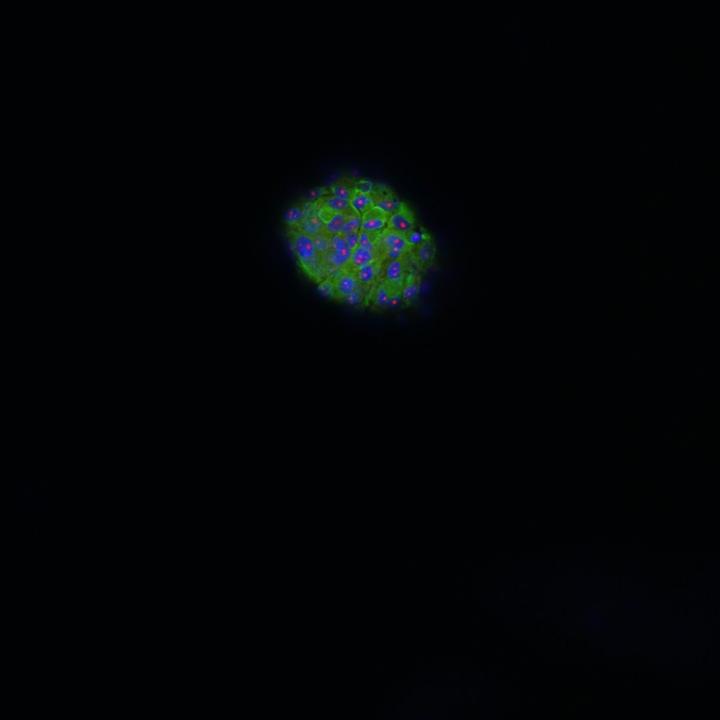
Credit: University of Plymouth Brain Tumour research Centre of Excellence
A research breakthrough shows that a simple blood test could reduce, or in some cases replace, the need for intrusive surgery when determining the best course of treatment for patients with a specific type of brain tumour.
Researchers at the Brain Tumour Research Centre of Excellence at the University of Plymouth have discovered a biomarker which helps to distinguish whether meningioma – the most common form of adult primary brain tumour – is grade I or grade II.
The grading is significant because lower grade tumours can sometimes remain dormant for long periods, not requiring high risk surgery or harsh treatments such as radiotherapy and chemotherapy. Tumours classified as grade II can progress to become cancerous and more aggressive treatment may be needed in order to try to control their spread.
At the moment, meningioma patients are usually put on watch and wait, undergo radiotherapy or have surgery in an attempt to remove the tumour. Between 70 and 85% of meningioma cases are lower grade so, if the blood test – or liquid biopsy – is carried out these patients may well be spared surgery or radiotherapy.
The team at Plymouth, led by Professor Oliver Hanemann, has published its work on this novel biomarker known as the protein Fibulin-2 (FBLN2) in the International Journal of Molecular Sciences. FBLN2 has not previously been shown to play a role in meningioma development, although it has been linked to other types of cancer such as forms in the lung, liver, breast and pancreas. The team therefore believes that this study is the first to link the FBLN2 protein as a biomarker for meningioma.
The results build on the important work of the Plymouth centre to identify non-invasive biomarkers of different grades of meningioma tumours. More information on an earlier paper, “GATA-4, a potential novel therapeutic target for high-grade meningioma, regulates miR-497, a potential novel circulating biomarker for high-grade meningioma” can be found here https:/
Using tumour samples, cancer cells grown in the laboratory and liquid biopsies from patients, the scientists were able to distinguish grade I from grade II tumours. In a smaller sub-study, the researchers have shown that levels of the biomarker could differentiate between good (slower growing) and bad (faster growing) grade tumours as defined by genetic make-up.
Prof Hanemann said: “In this study, we identified FBLN2 as a novel biomarker that can distinguish grade II from grade I meningiomas. Higher levels of this biomarker were found in tumour samples from grade II meningioma compared with the grade I form. We also showed that higher levels of FBLN2 can be detected in blood samples from grade II meningioma patients, compared to those from grade I meningioma patients. The identification of FBLN2 as a biomarker for meningioma has significant potential to improve the diagnosis, treatment, prognosis and follow-up of meningiomas.”
Hugh Adams, spokesman for Brain Tumour Research, which funded the study said: “This is an exciting breakthrough which could see patients spared the ordeal of neurosurgery at what is already likely to be one of the most difficult times of their life. In the UK, 16,000 people are diagnosed with a brain tumour each year and more children and adults under the age of 40 are lost to brain tumours than any other cancer.”
Victoria Bradley, aged 50, from Plymouth, was diagnosed with a meningioma in 2017 and underwent surgery at Derriford Hospital six weeks later. She has lifelong side effects including debilitating seizures. No longer able to work as an overseas holiday representative, Victoria is now developing a mindfulness and meditation app to help others with brain tumours and epilepsy.
“My diagnosis and operation has changed everything about my life,” she said. “Going through neurosurgery is a massive thing. I live in constant fear, no longer feel comfortable going out on my own and always, always, have an emergency alarm with me to call help in case I have a seizure.
“It is absolutely wonderful and incredible to think that, one day, patients like me might not have to go through surgery.”
It is hoped the findings will contribute to the development of more personalised treatment options for patients with meningioma. Indeed, there exists a lack of consensus currently on the best management for grade II meningioma. FBLN2 could become a valuable tool for identifying and treating meningioma, accessible through a non-invasive blood test. Further research is required to assess the accuracy of diagnosing meningioma using a liquid biopsy for FBLN2 in comparison to current methods.
###
The Plymouth centre is part of a network of Brain Tumour Research Centres of Excellence. It is funded by Brain Tumour Research which is the only national charity in the UK singularly focused on finding a cure for brain tumours through campaigning for an increase in the national investment into research to £35 million per year, while fundraising to create a sustainable network of brain tumour research centres in the UK.
Media Contact
Amy King
[email protected]
Related Journal Article
http://dx.




